AJN News
Antisemitism. Argentina confirms the increase of a hundred percent of ansemitic incidents
AJN Agency.- The Asociation of Israeli Delegations in Argentina (DAIA) confirms an increase of 107 percent in the number of antisemitic incidents in Argentina during 2018 in comparation with the previous year, as AJN Agency of News had advanced.
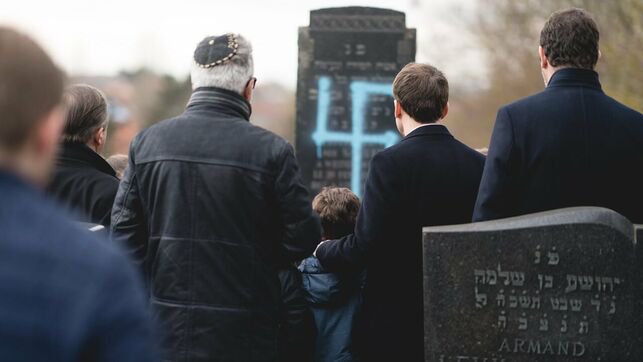
AJN Agency.- “We have registered an increase of 107 percent of antisemitism in Argentina by the denunces recibed at DAIA”, said the president of DAIA, Jorge Knoblovits, during a toast for Rosh Hashaná (Jewish New Year).
The actual report of antisemitism will be officialy presented at 12 pm, Buenos Aires Time, in Centro Cultural Kirchner at Buenos Aires.
Following the report, there had been 834 antisemitic acts in 2018, in comparation with the 404 reported in 2017.
The estadistics and investigation will be presented by DAIA and INADI (National Institute against Discrimination, Xenophobia and Racism).
The anual report of antisemitism was realized by DAIA with the Gino Germani Institute and the Center of Social Studies.
This year is the number 20 since the fisrt anual report published by the political organization of the argentinian jewish community, that stablished that practice in 1998.
Report shows that 68% of the incidents had place in Buenos Aires, and 32% where in the rest of the country. About the 834 reported incidents, DAIA said that 71% happend online, mostly in web sites, and 17% of that number appeares in social networks.
The report also shows that 27% of antisemitic material online had xenophobia against jews, while 18% was pushed by the events that took place in Middle East, 17% had relation with nazi simbology and jewish world domination conspiracy among other misconceptions.
The president of DAIA, Jorge Knoblovits, said to the media that «the increase of antisemitic messages is phenomenon that had been taking place in Argentina since a long time”.
«A new item (of antisemitism) was observed in the last year in which had been personal attacks against the referents of the jewish community as the Rabbi of Rosario or what happend in Buenos Aires with the agression to people wearing kippot, that had ocurred in Europa before but not in Argentina”, added.
Gino Germani Insitute present a poll of social perceptions of Jews in Argentina.
The poll shows that 53% of 1443 people interviewed agrees that there is discrimination against jews, while 87% didn’t know what it was the zionism.
The Report remarks that 61% agreed with the antisemitic prejudice of the «influence» of jews in international markets and 47% belives that jews are the first in not helping people in need.
The information for this poll was collected between June and July of this year.
In the presentation of the report, will join Knoblovits, the president of the Conferencia Episcopal Argentina y the bishop of San Isidro Monseñor Oscar Ojea, Néstor Cohen, who runs the investigation of Gino Germani Institute, the director of Social Center, Marisa Braylan and one of the principal investigatores, Verónica Constantino.
AJN News
Argentina. Milei reflected on the Torah: «Those who play in all directions are the worst»
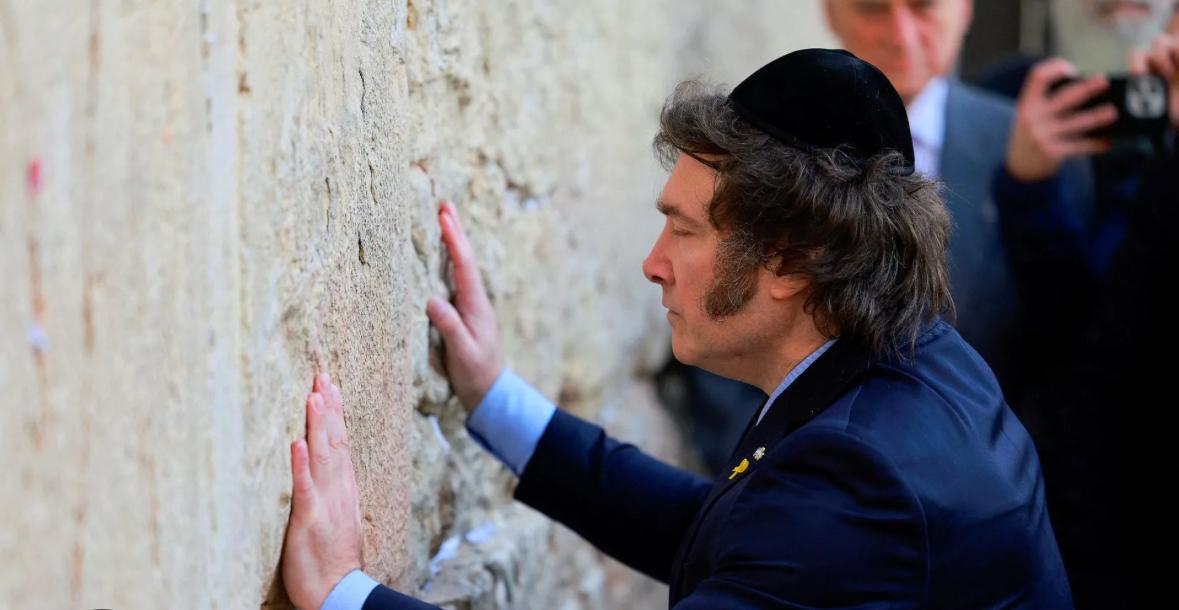
Agencia AJN.- Argentinian President, Javier Milei, once again resorted to the Torah, the sacred book of Judaism, to make a «reflection», such is the title of a post on his personal profile on the social network X that alludes to the political situation in his country, although in general terms.
On this occasion he referred to the current parashah (weekly reading portion of the Torah), Toldot, corresponding to the Book of Breishit (Genesis), which extends from perek (chapter) 25 and pasuk (verse) 19 to 28:9.
«The parasha says that Rivka, the wife of Yitzchak (Rebekah and Isaac), was worried when she was pregnant, because when she passed by a place of sanctity she felt that her son wanted to go there and when she passed by an impure place, too. And she was worried. and she went to consult with a prophet. The prophet answered her: you have two sons in your womb. One will be a leader of the people of Israel (Yaakov, Jacob) and another Esav who will be very evil, and will want to harm Yaakov and his offspring. And then she calmed down,» said the South American president.
«The question: does Rivka calm down after she is sure that she has a completely evil son, and before when she thought she had only one son she didn’t know what he would be like she was very disturbed?,” he asked.
«The answer: Rivka, when she thought that she had a single son, that he was LUKE without ideology and played for both sides, that worried her a lot. But then she found out that she has two, and it is clear that one plays for one side and the other completely the other way around, she calmed down,» Milei answered.
«Moral: Those who play for all sides are the worst of all, even much worse than the one who is completely evil. Because the one who is evil and shows himself as such, we have identified him. On the other hand, the other behaves like a good person and we never know what his attitudes and his evil intentions are,» he concluded, before saying goodbye with a «SHABAT SHALOM.»
AJN News
Argentina | Holocaust and Heroism Day. President Milei’s major speech against anti-Semitism and terrorism
»Therefore, in keeping with our history and with what we consider to be true, we ratify today our spirit of friendship and collaboration with the State of Israel and we offer Argentina’s candidacy for the International Presidency of the IHRA», expressed Milei.
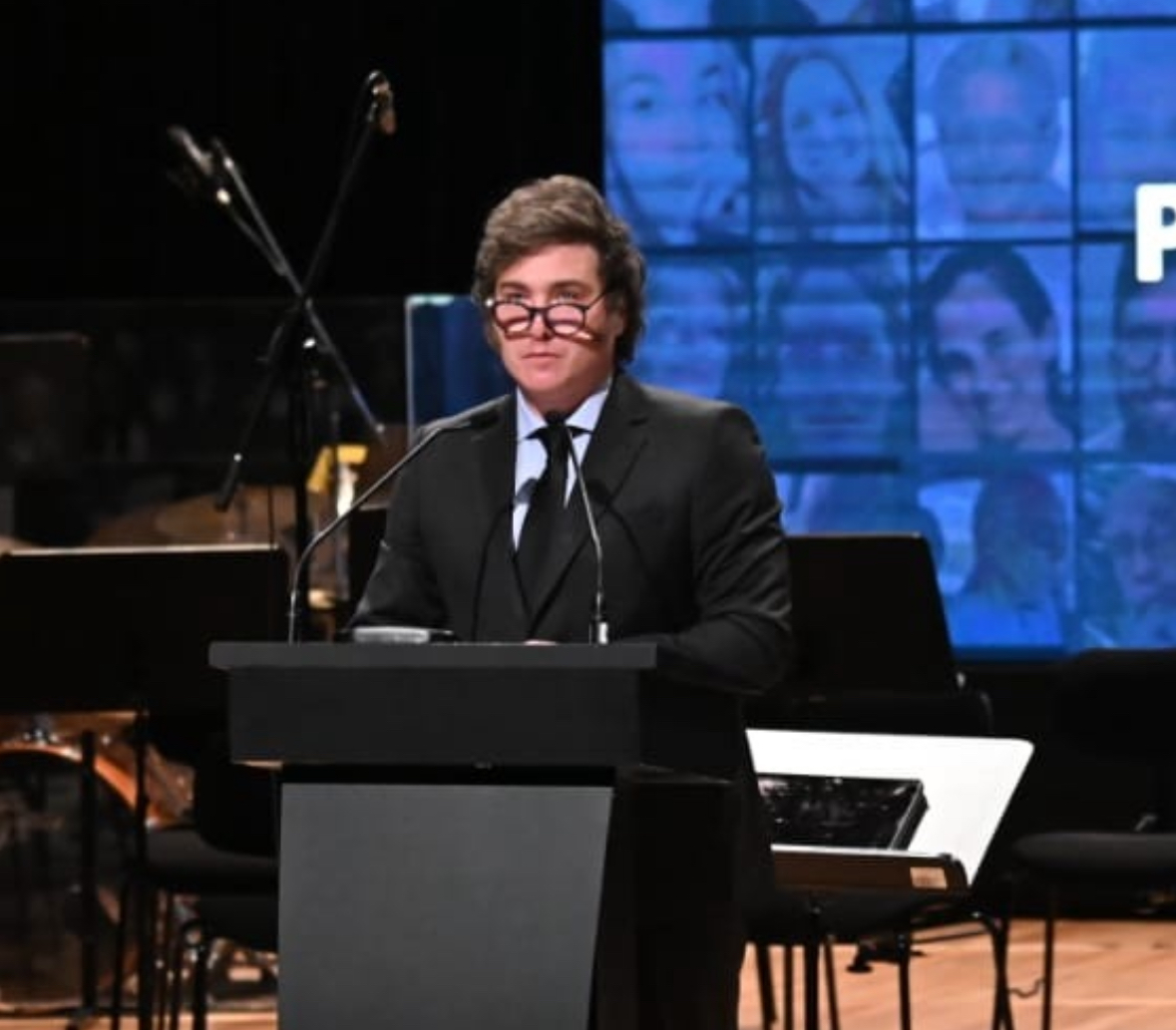
Agencia AJN.- At an event organised on Wednesday by the Delegation of Argentinean Israelite Associations (DAIA) and the Holocaust Museum of Buenos Aires to commemorate Holocaust and Heroism Day, the 81st anniversary of the Warsaw ghetto uprising, President Javier Milei announced ‘Argentina’s candidacy for the presidency of the International Holocaust Remembrance Alliance’ (IHRA).
The IHRA is an intergovernmental organisation of 35 states whose aim is to combat acts of anti-Semitism, intolerance and discrimination that can lead to genocides such as those experienced by humanity in the 20th century.
The main event was also attended by Nazi survivors, relatives of people kidnapped by Hamas, national, provincial and municipal authorities, judges, political leaders, diplomats, representatives of different religious denominations, community leaders, among others.
Argentina. Discurso y anuncio del presidente Javier Milei en el acto del Día del Holocausto organizado por el Museo del Holocausto y la DAIA @JMilei @DAIAArgentina @museoshoa #HolocaustRemembranceDay #YomHaShoah @Isaac_Herzog @AmbEyalSela @netanyahu #israel @israelmfa… pic.twitter.com/8uQVSq1inE
— Agencia AJN (@AgenciaAJN) May 9, 2024
President Milei’s full speech:
At the outset, I would like to pay tribute to Lior Rudaeff, an Argentinean living in Israel who was kidnapped and murdered by the Hamas terrorist organisation on 7 October. I would like to extend my sincere condolences to his family and loved ones, and call for the return of his body so that he can be given a proper farewell by them. Baruch Dayan Haemet to him and to all the victims of Islamic terrorism in Argentina and the world.
Today more than ever there can be no doubt that the scourge of Islamic terrorism on Israel and the Jewish people is not a problem alien to us Argentines, but one that affects us directly. First, because 21 Argentines were murdered by Hamas on that tragic day, 20 more Argentines were kidnapped and today, seven months after the attack, there are at least eight compatriots for whom we still do not know whether they are still among us or whether they have passed on to another life. Secondly, because when a battle is fought between good and evil, between freedom and oppression, between civilisation and barbarism, taking sides is not one option among others but a moral obligation.
Today we are here to remember perhaps the greatest tragedy in the history of mankind, we are doing so under the name of Holocaust and Heroism Day, and I would like to pause to discuss with you this second concept, heroism. Because I believe that the heroism and virtue of men is the flip side of tragedy, it is the only thing that can make the righteous prevail over those who seek to oppress them and rob them of their freedom. And because I believe that in times of darkness, when speaking out is costly and when the majority prefer to turn their backs on righteousness for their own convenience, promoting virtue is a commandment and a duty.
We remember today the Jewish resistance in the Warsaw ghetto, where 300,000 souls were imprisoned in inhumane conditions for three years by the Nazi regime, only to be transferred to extermination camps as we all know. We remember that one day in 1943 the prisoners took what few weapons there were and put up a fight. For 27 days they fought for their freedom, under unequal conditions and with virtually no chance of success. They fought for their freedom, which is a just cause in every time and place, and they chose to die fighting rather than be killed.
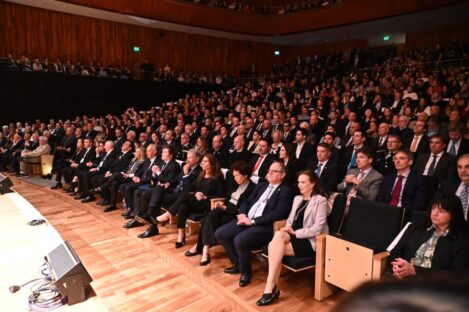
The struggle for freedom against adversaries always more powerful than themselves has been a constant in the history of the Jewish people, and has forged for them a heroic spirit, a warrior spirit. This is already clear in the sacred scriptures, it is seen in the exodus of the Jewish people from Egypt, escaping from the yoke of Pharaoh, leaving behind slavery to embrace freedom. The revolt of the Maccabees is clear when, despite being in a distinct minority, the least against the most, the weak against the powerful, they drove out the Greek invader and recaptured Jerusalem. It was never the number of soldiers that mattered, but the forces that came from heaven.
Fighting battle upon battle for over 4,000 years, though many were lost and though the temple in Jerusalem was destroyed twice, the Jewish people persisted. And today again, being under threat, surrounded by enemies who pursue a goal akin to the goal of those who imprisoned more than 300,000 souls in the ghetto 80 years ago, because the intention of Hamas on 7 October was the same as that of the Nazis, to directly and deliberately murder innocent people, if they did not do it on a larger scale, it was not because they did not want to but because they could not.
Today, we see in parallel to these sad events a recognition in the world of both intolerant Islamic fanaticism and anti-Semitism in its different versions. And to make matters worse, we see how all these phenomena are not perceived by the free world with the sharp condemnation and firm action they demand, but with discomfort and ambiguous gestures. I look around me at the rest of the leaders of the free world, especially the leaders of the great nations that should be the pillars of global freedom, and I see indifference in some and fear in others to stand on the side of truth.
Today the world is silent while there are still more than 100 hostages suffering, eight of whom are fellow Argentines. Not to mention the blatant anti-Semitism that has become commonplace on the campuses of educational institutions entrusted with the professional and human training of the West’s elites. I believe that the heroism we talk so much about and want to promote is also to defend the truth, to speak the truth when around us the truth is silenced.
That is why when the world is silent, we have an obligation to speak out, because it is the silence of the good that allows the barbarity of the bad, and because speaking out, looking straight and not turning a blind eye, even though it is difficult, even though for many it is inconvenient, is the only way to ensure that the Shoah is not repeated.
Emotivo acto del Día del Holocausto en Argentina con la presencia del presidente @JMilei organizado por @museoshoa y @DAIAArgentina.@JKnoblovits @CancilleriaARG @mondino @IsraelMFA @JonathanPeled @Isaac_Herzog @netanyahu @AmbEyalSela @LiorHaiat @BringThemHome23 #Israel pic.twitter.com/4gau1RIqiR
— Agencia AJN (@AgenciaAJN) May 9, 2024
And because God will not accept justifications or exculpations when it comes to rendering his ultimate judgement, we will not be able to tell him what, but I could not or what virtue was not convenient at the time, he will not judge us for what we thought, believed or wanted, but for having done the right thing in life. That is why today remembering the Shoah, remembering heroism and denouncing Islamic terrorism is an obligation, because without heroes we are defenceless in the face of an ever darker and longer night.
In closing I would like to thank Marcelo Mindlin, Jorge Knoblovits and the rest of the authorities of the DAIA and the Holocaust Museum for organising and inviting me to be part of this commemoration at such a difficult time for the Jewish people that demands that we all work back-to-back.
I also want to tell you that Argentina is a historic friend of the Jewish people. We were the first country in the region to recognise the existence of the State of Israel and today we proudly have the largest Jewish community in Latin America and the tenth largest in the world. Together with the Jewish community, we have suffered the cowardly attacks by the Iranian government, not only on the Jewish-Argentine community, but on the Argentinean people as a whole, which, thanks to the persistent efforts of those who seek the truth, are now, three decades later, beginning to be clarified.
Therefore, in keeping with our history and with what we consider to be true, we ratify today our spirit of friendship and collaboration with the State of Israel and we offer Argentina’s candidacy for the International Presidency of the IHRA (video), an institution whose value takes on new relevance and urgency every day, at a dark time, when the rest of the world is turning its back on Israel, they will find us at their firm side always.
Finally, and lastly, I would like to conclude with a letter from Rabbi Samson Raphael Hirsch, which seems to me to be very pertinent to the times we are living in and which should be present in our lives every day. This letter says: ‘Those who are convinced that their opinions are true and correct must express them constantly and at every opportunity with candour, and without regard to the degree of support they have and the level of opposition they will encounter. Lies need supporters to succeed; lies need the authority of majorities to fill what they lack in the rightness of their argument. Truth, on the other hand, will always win out in the end. Even if it takes time, noble, courageous and pure, expressed with all the ardour of conviction and with all the clarity of a sure conscience, expressed again and again on every occasion, it will eventually win the respect and esteem of even those who refuse to accept it. The only truth that has been lost without the possibility of regaining it is that whose possessors have not the courage to speak frankly of it. Truth was never defeated by the forces of resistance, it was only defeated when its possessors were too weak to defend it’.
Thank you very much.
-
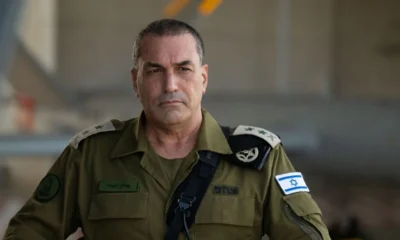
 Israelhace 22 horas
Israelhace 22 horasEl jefe de las FDI insinúa una guerra prolongada: «Lanzamos esta campaña para eliminar la amenaza»
-
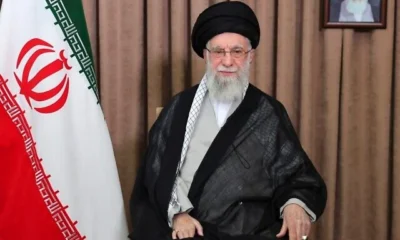
 Medio Orientehace 3 horas
Medio Orientehace 3 horasKhamenei ha elegido a tres posibles sucesores en caso de ser asesinado
-
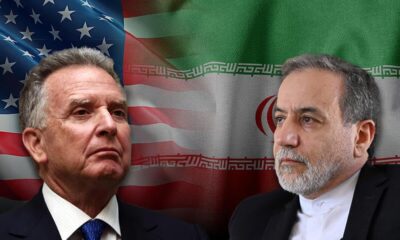
 Medio Orientehace 22 horas
Medio Orientehace 22 horasIrán rechaza negociaciones con Estados Unidos mientras continúen los ataques israelíes
-
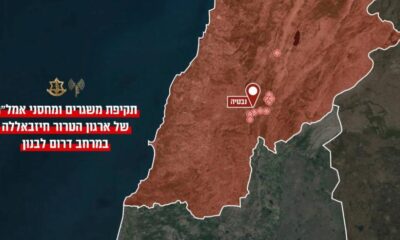
 Medio Orientehace 23 horas
Medio Orientehace 23 horasLas FDI llevaron a cabo una serie de ataques contra objetivos de Hezbolá en el sur del Líbano
-
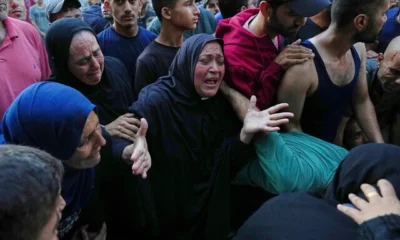
 Medio Orientehace 21 horas
Medio Orientehace 21 horasLas autoridades sanitarias controladas por Hamás afirman que los ataques israelíes abatieron a 44 palestinos
-

 Medio Orientehace 20 horas
Medio Orientehace 20 horasIrán dispara misiles más avanzados a medida que Israel suaviza las restricciones
-
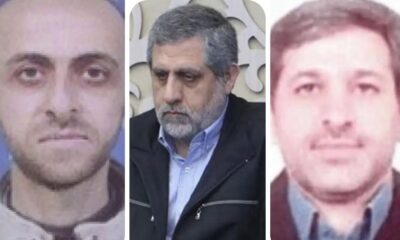
 Medio Orientehace 2 horas
Medio Orientehace 2 horasIsrael elimina a tres altos responsables iraníes y de Hamás, hombres claves en la financiación y armamento del terrorismo
-
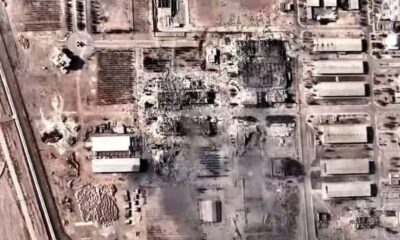
 Medio Orientehace 1 hora
Medio Orientehace 1 horaLas FDI atacan la central nuclear de Isfahan, en el centro de Irán


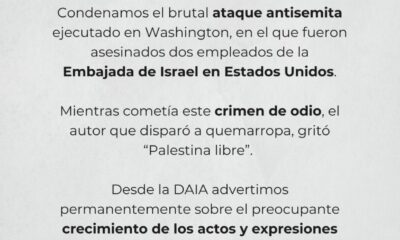

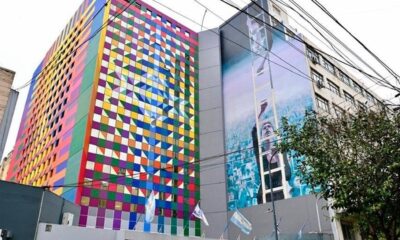



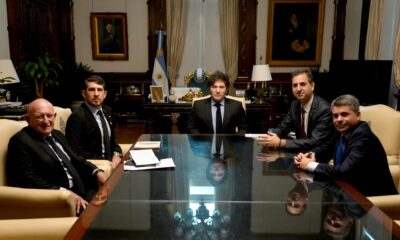

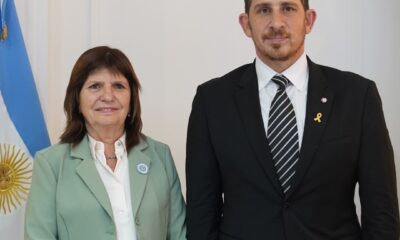

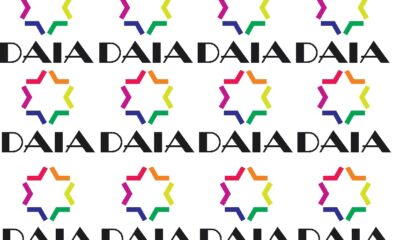


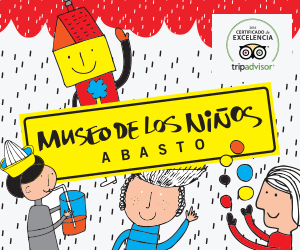
 Suscribite al Whatsapp!
Suscribite al Whatsapp!